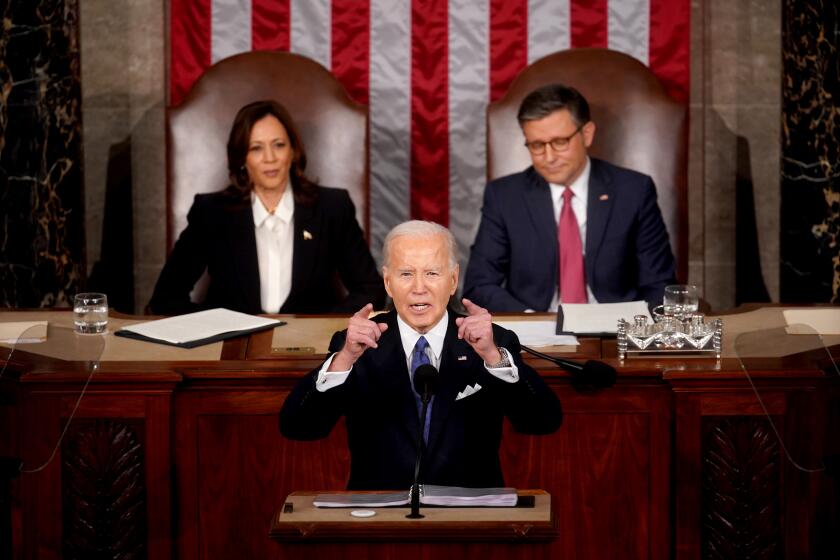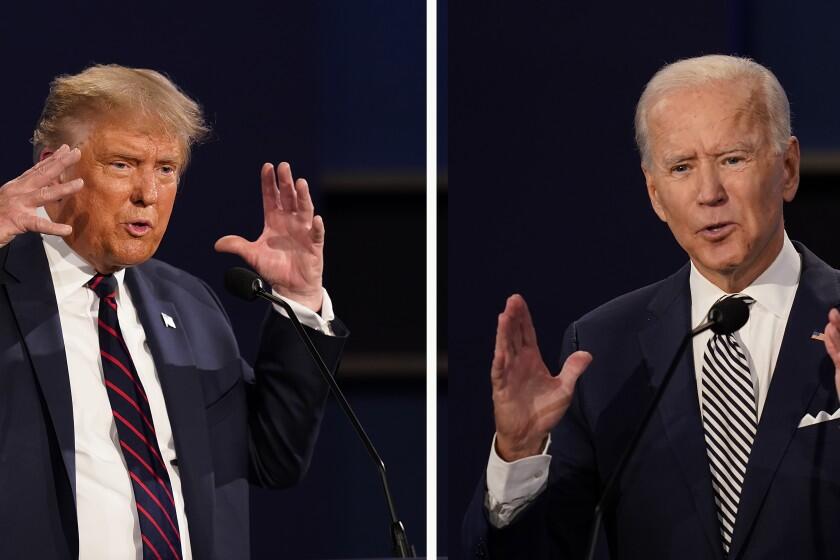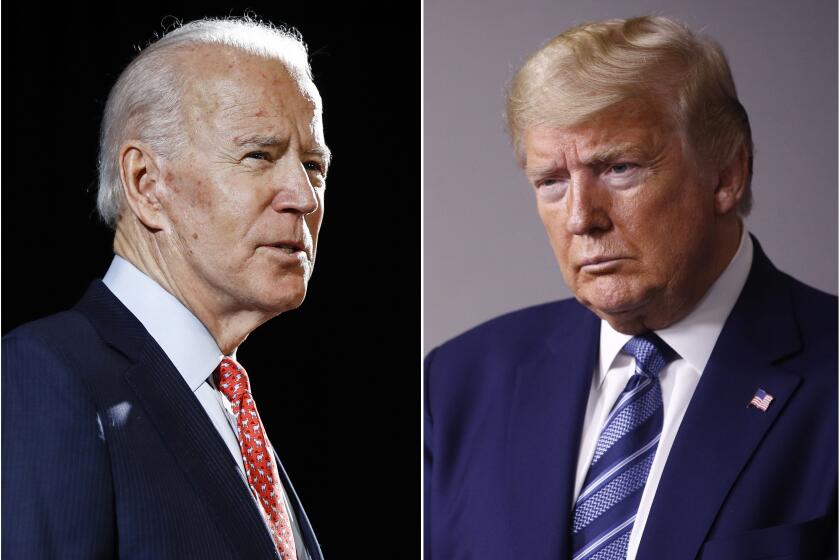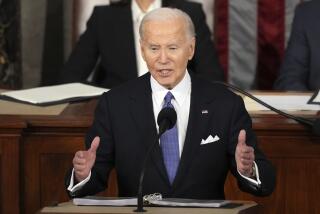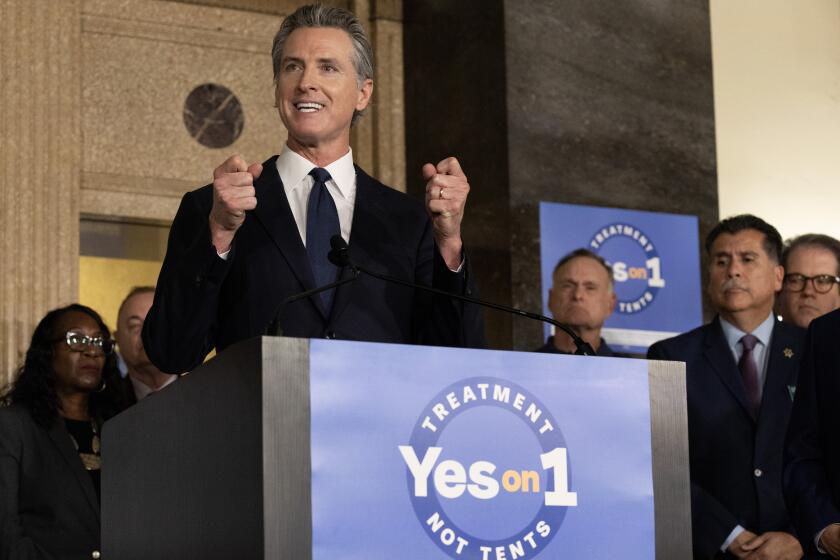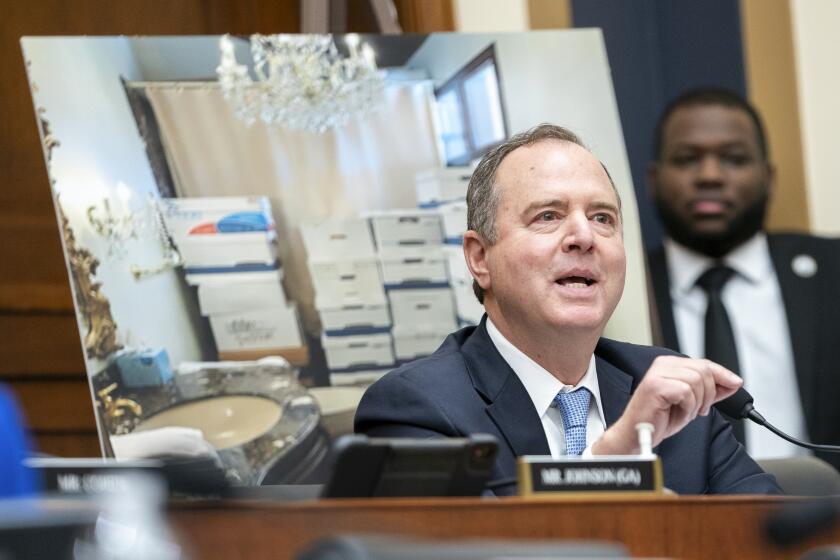Column: Biden says America is ‘coming back.’ Trump says we’re ‘in hell.’ Are they talking about the same nation?
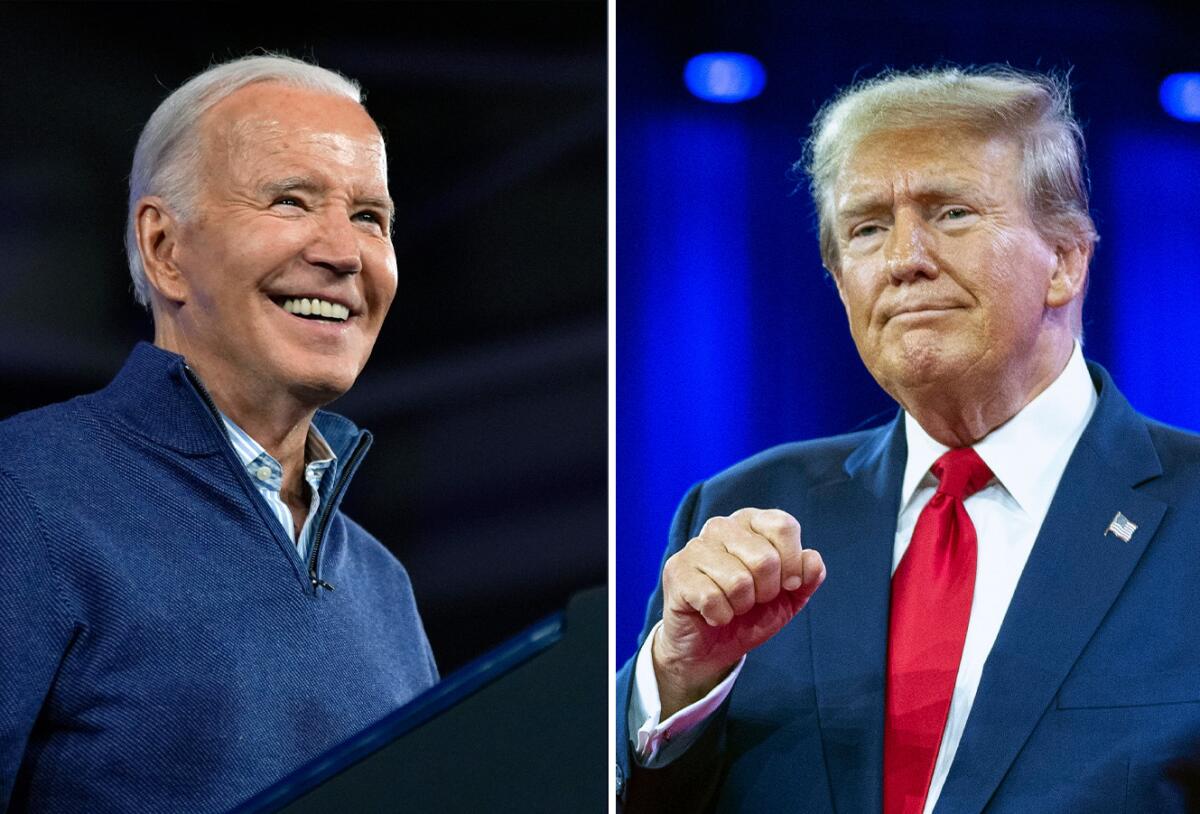
To one presidential candidate, the United States is “a failing nation” that’s “descending into a cesspool of ruin.” “In many ways, we’re living in hell right now.”
To the other candidate, “America is coming back. … Our future is brighter.” “The American people are writing the greatest comeback story never told.”
You already know which candidate is which.
The first is former President Trump, who painted a vivid picture of an America sliding into chaos for the Conservative Political Action Conference last month. The second is President Biden, extolling the nation’s resilience in his State of the Union address last week.
The collision of those starkly conflicting visions is the core of the 2024 presidential election.
Political professionals say a successful campaign offers voters a compelling narrative, a story about the state of the nation: What’s gone wrong, what’s going right, and what does the candidate propose to do about it?
“You have to explain where the country is, how you’re going to make it better, and how it’s going to affect their lives,” said Doug Sosnik, who helped President Clinton win reelection in 1996.
State of the Union addresses seldom matter much. This one did: It was Biden’s first big opportunity to convince voters that he’s still up to the job.
Rarely have two major candidates presented narratives so wildly at odds. They seem to be describing wholly different realities.
Biden’s narrative rests on three arguments. He says the economy is recovering from the COVID-19 pandemic and the accompanying recession — the “comeback story” he trumpets. He says he will guide the country to a more prosperous and equitable future, financed by tax increases on corporations and the wealthy. And he charges that Trump would “pull America back to the past” by restricting abortion rights and other freedoms.
“Our economy is literally the envy of the world,” Biden said. “Wages keep going up. Inflation keeps coming down…. It takes time, but the American people are beginning to feel it.”
The main threat to continued progress, he said, is Trump, whose refusal to accept the results of the 2020 election reflects his desire to rule as an autocrat.
“When he says he wants to be a dictator, I believe him,” Biden said of Trump on Saturday, a day after the former president met with Hungary’s dictatorial leader, Viktor Orban.
Has Biden’s narrative hit home? Reviews were mixed.
Some Democratic strategists worried that the president’s upbeat economic message was out of sync with the views of most voters, who tell pollsters they think the economy is in bad shape.
In swing states, where Biden doesn’t have a big Democratic cushion to protect him, the impact of independent and third-party candidates could be enough to swing the outcome to Trump.
“I would have framed it a little differently,” Sosnik said of the State of the Union address. “I would have said we inherited an economic crisis and we’re moving in the right direction, but we still have more work to do. You have to meet people halfway.”
But Sosnik said Biden’s calls to increase taxes on the wealthy, lower the prices of prescription drugs and help first-time home buyers probably landed better.
“That’s the narrative he’s running on — a populist narrative,” the strategist said.
Trump’s America sounds like a very different place.
“We are a nation whose economy is collapsing into a cesspool of ruin, whose supply chain is broken, whose stores are not stocked,” the all-but-certain Republican nominee claimed last week. “We are a nation where free speech is no longer allowed, where crime is rampant and out of control like never before.” It was an echo of his 2017 inaugural address, when he described the state of the nation as “American carnage.”
As is often the case with Trump, a fact-check is in order: The economy, far from collapsing, is growing at a healthy pace of about 2.5% a year; the supply chain disruptions of the pandemic are almost entirely over; and violent crime has dropped significantly since 2022.
Tariffs on foreign goods aren’t paid by other countries; they’re paid by American consumers — and they often fail to protect jobs.
Trump blames two causes for the nation’s problems: “radical left Democrats” and asylum-seeking migrants who have come across the nation’s southern border.
In a second Biden term, he told conservatives, so many migrants will enter the U.S. that “Medicare, Social Security, healthcare and public education will buckle and collapse.”
“Ruthless gangs will explode even more into the suburbs,” he warned, “... while weaponized law enforcement hunts for conservatives and people of faith.”
“Our country is being destroyed, and the only thing standing between you and its obliteration is me,” Trump claimed.
Biden and others have pointed out that Trump ordered Republicans to block a bipartisan compromise that would have tightened border security, apparently because the former president wants to keep the crisis going as a campaign issue. “We can fight about fixing the border or we can fix it,” Biden said in his State of the Union address. “I’m ready to fix it.”
Polls suggest that if the election were held tomorrow, Trump would narrowly win. But his unpopularity rivals Biden’s, and a lot could change in the next nine months.
Trump’s pitch, Sosnik said, “sounds as if it’s intended to turn his base out, not appeal to swing voters.”
Those are the narratives on which the next eight months of campaigning will be based.
If Biden’s sounds over-optimistic, Trump’s sounds cartoonishly dystopian, out of sync with the reality that the economy is genuinely improving.
Trump appears to be relying on voters to stay unhappy about high prices and to blame Biden for the border crisis — but not hold the GOP accountable for blocking a potential solution.
Biden is hoping he can remind swing voters of the reasons they disliked Trump in 2020, and — above all — bank on the economy to continue improving.
Which narrative will connect best with voters’ real-life concerns?
That’s what the next eight months of campaigning are about.
More to Read
Get our Essential Politics newsletter
The latest news, analysis and insights from our politics team.
You may occasionally receive promotional content from the Los Angeles Times.
